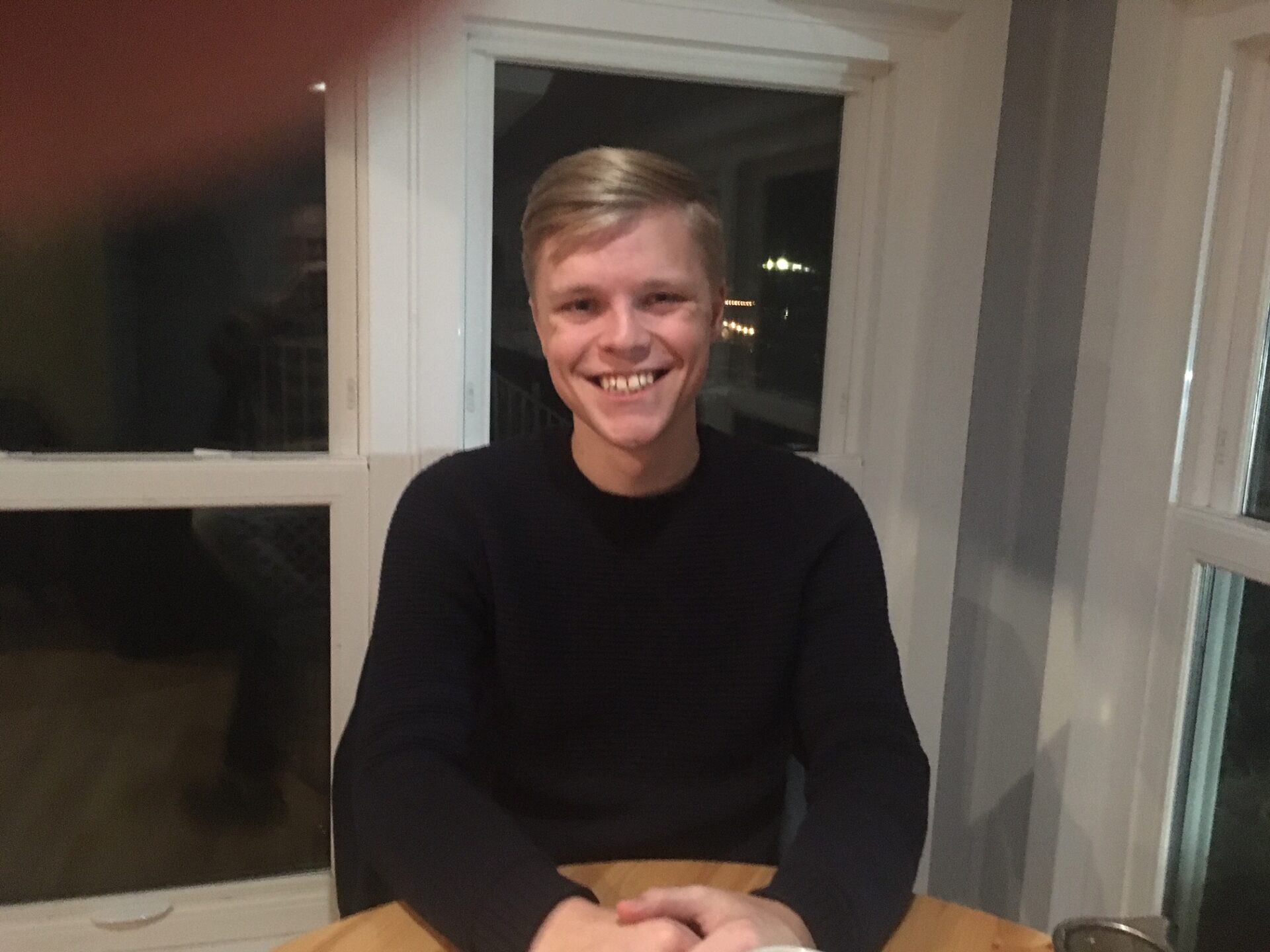Brian Cabell sits down with 23 year old Evan Bonsall, Marquette’s newly elected City Commissioner, to find out more about this young man’s boyhood, his Harvard education, his longtime girlfriend, his hero in life, and his vision of Marquette’s future.
BC: You were born and raised here?
EB: Yeah, I was born and raised in Marquette. I grew up in a small, blue house on Woodland Avenue near the township and city line. Most of my family actually lives in Trowbridge. There are a lot of Bonsalls in the Marquette area.
BC: What was your childhood like?
EB: Well, we had a backyard with lots of trees and we had a lot of kids in the neighborhood so it was a great neighborhood to grow up in. I come from a working class family. My parents didn’t make a lot of money–my dad was a police officer, my mom was a secretary.
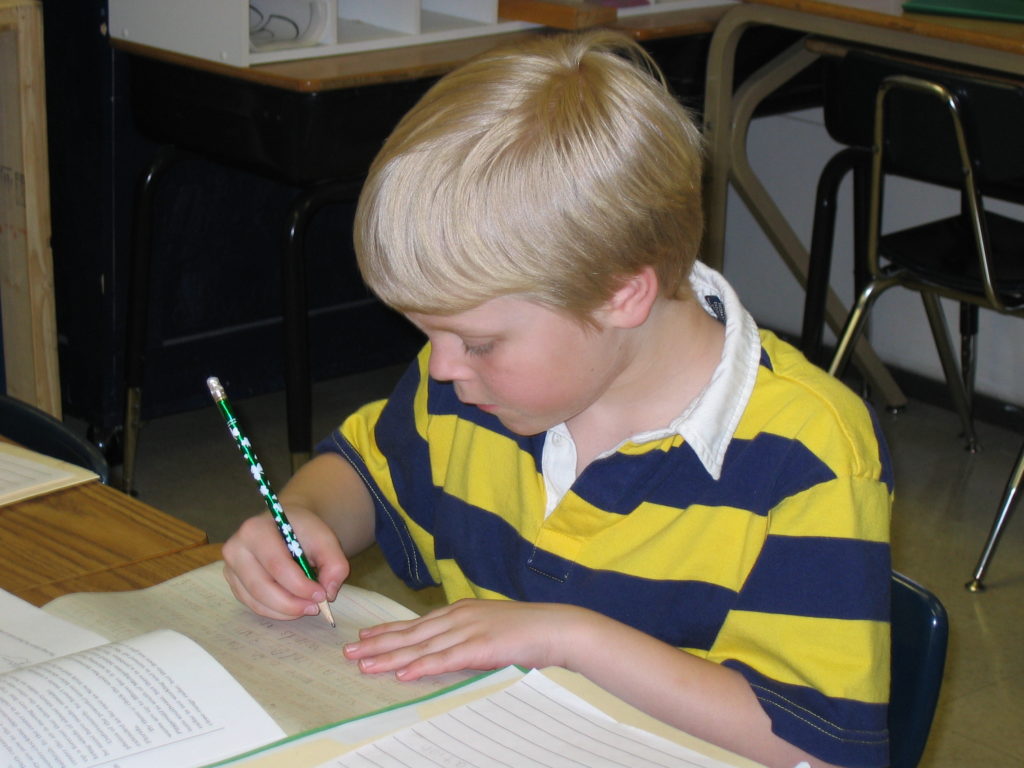
Evan, here in third grade, attended Vandenboom Elementary School.
BC: Brothers? Sisters?
EB: I have one younger brother, Garrett. He’s about two and a half years younger than me.
BC: Did you play sports?
EB: I played a lot of different sports when I was a kid but when I got a little older, I was really only playing soccer. Later on, I got into cross country skiing mostly because I started dating someone in eighth grade who was really into it. So I still ski and I’m still together with the girlfriend I had in eighth grade–
BC: I gotta stop you right there. Dating in eighth grade? Seriously?
EB: (laughing) Yep, we’re still together nine years later.
BC: I’m curious, what does dating in eighth grade amount to?
EB: Both of our moms driving us to the movies, I guess. The first date we went on, we went to the Delft Theater when it was still a movie theater. I think they shut down about a year or two later. So I think our relationship worked because we were really cold and maybe a little miserable but also having fun seven days a week here in the winter skiing, and we’re still together nine years later.
BC: What attracted you to her?
EB: I think it was just that she was her own person, her own individual, but she was also very smart and very kind. We’ve just gotten closer as the years have gone by. We’ve grown up together.
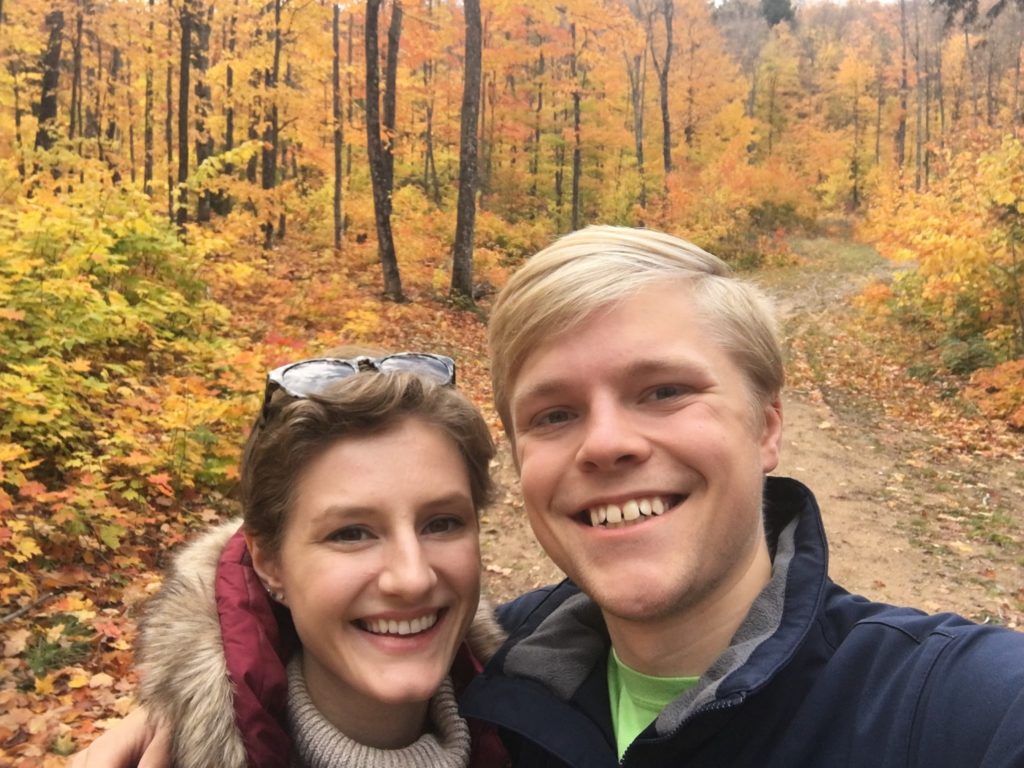
Bonsall, with Aubrie Jacobson, his girlfriend of more than nine years.
BC: The obvious question, of course, is, “All right, it’s been nine years so—”
EB: (laughing) Well, we’ll see. Right now I have some commitments in the city of Marquette–of course, I was just elected to the City Commission–and she’s from Marquette. We both went to school here and she still lives out in Sands Township. But now she’s going to grad school. She’s a pianist–she plays piano in the summer at St. Michael’s Catholic Church and plays with the city band. So she’s been very involved in music and now she’s pursuing a Masters and eventually a Doctorate in musical arts at the University of Wisconsin Madison.
BC: So you went to high school here?
EB: Yeah, I graduated from Marquette Senior High School in 2015, and I was going to go to the Bonsall family alma mater Northern Michigan University, but I had a great high school counselor, Chris Swadley–and a couple of really good teachers, as well–and they encouraged me to push myself. So I applied to Harvard and Yale, and I was accepted at both of them, and Harvard offered me a full-ride scholarship, based on my family’s financial need, so I ended up going there. I was very fortunate, I came out of there with no debt.
BC: So Yooper boy ends up in Cambridge, Massachusetts. What were your first impressions when you got there?
EB: I showed up on campus for the freshman orientation but unlike most of my classmates, I had never visited before. I kind of went in blind. I was fortunate to make a few really good friends early in my freshman year and they kept me grounded in what otherwise might have been a lonely and discouraging experience. I definitely struggled initially with the academic and social life there, but eventually I started feeling a lot more comfortable there, and I found the best way to get by was to focus on what I was really interested in and passionate about from an academic standpoint, and from a social standpoint. Really, I just ended up sticking with that close group of friends that I met that first semester of freshman year.
BC: Did you find the people there different from what you were used to here?
EB: There’s a lot of diversity at a place like that. You get different perspectives and experiences from all over the world–that was probably the most valuable part of the whole experience, really. I feel I learned as much or more from my classmates as I did in the classroom.
BC: Academically, you weren’t overwhelmed?
EB: Initially, I would say I was. There were a lot of late nights, studying for tests and finishing papers. But the last two or three years, I felt a lot more comfortable. My freshman year was definitely an adjustment.
BC: So, you entered Harvard with a passion for politics and public service…and you left the same way?
EB: Yeah, I came in intending to major in government and that’s what I ended up majoring in. Really, my passion for government and public service goes back to when I was a little kid. I just remember watching a lot of documentaries about American history and things like that, admiring certain people throughout American history. And then my parents were also involved in public service. My dad was a deputy sheriff–I don’t come from a political family at all but most of my family are in public service careers. A lot of my aunts and uncles are nurses or teachers. And my mom worked for the Marquette city police department for 30 years, and was a union vice president there. She was also involved in the Parent Teacher Association, and she’s still really involved in the preschool at my church. My parents were my inspiration early, but later on the people who got me involved in local government were John Kivela and Tom Baldini. They were really good friends and mentors.
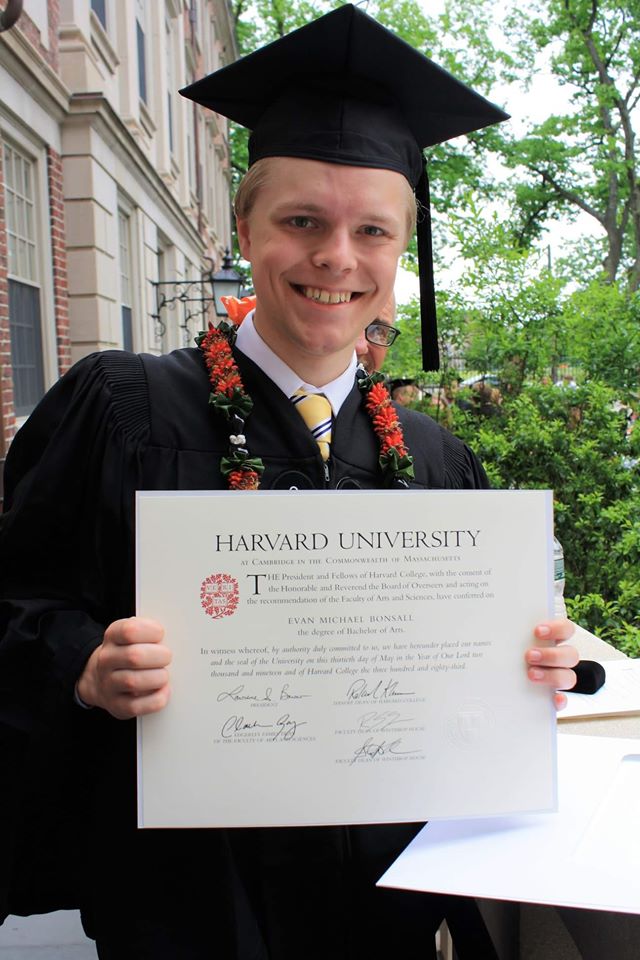
Bonsall graduated Harvard only six months ago.
BC: So you finish Harvard. Was your intention all along to come back to Marquette?
EB: Honestly, my initial intention was not to come back to Marquette, at least not for quite a while. But I think one of the most valuable things I learned at Harvard is that I realized I wanted to come back to Marquette. I felt that I could make a greater difference in public service back in the community where I grew up, as opposed to some other place. So I decided to come back to Marquette if I could get an opportunity here. I applied for a program called Lead for America–it’s like Teach for America, only it’s for government. And what they do is set you up with a two year fellowship that’s funded by the local unit of government that you’re working with, two years, full-time, and you work on whatever projects they need you to work on. So I work with Marquette County. My title is assistant to the County Administrator Scott Erbisch. And when I get done with that fellowship, I intend to stay in the community, maybe go to grad school on line, maybe pursue a Masters in planning or administration, something like that.
BC: When did you start thinking “I may be awfully young but I’d like to get into electoral politics”?
EB: Even when I was in high school, John Kivela had encouraged me to think about running for office some day, so it was something I was thinking about. When I was a senior in high school, I was appointed to my first city board–the Sustainable Community Committee, and I really enjoyed that experience. And when I went off to college, I applied to be appointed to the Parks and Recreation Board two and a half years ago because I looked at the meeting schedule and found that I could make the vast majority of the meetings because we had a lot of vacation time at Harvard. And I really enjoyed that experience, and it kept me engaged with the community. And then last year I applied to be on the Brownfield Authority so I was getting a lot of experience with local government.
BC: And that led to the run for City Commission?
EB: I didn’t really seriously consider it until Sarah Reynolds asked me if I would ever consider running for local office, and I said, “Yeah, I’ve thought about doing it at some point.” And she said, “Well, if you’re thinking about doing it in the next few years, this is the year to do it because there’s two vacancies and you’re going to be back from school.” And that made sense but I wanted to think about it, and then I decided to run, even though I was still finishing up at school.
BC: You were known during the campaign for knocking on a lot of doors. Any idea how many you knocked on?
EB: (laughing) I personally knocked about 6000 doors. I starting knocking in a snowstorm on January 2nd and people looked at me like, “Are you crazy?!” but a lot of those people later told me they voted for me because I knocked on their door in a snowstorm.
BC: It’s memorable.
EB: But I’ve got to give all the people who helped me out a lot of credit. It wasn’t just this quixotic quest of me going out there all alone knocking on doors although it felt that way sometimes, especially early on, but I ended up having more than 30 people knock doors for me during the campaign. All different ages.
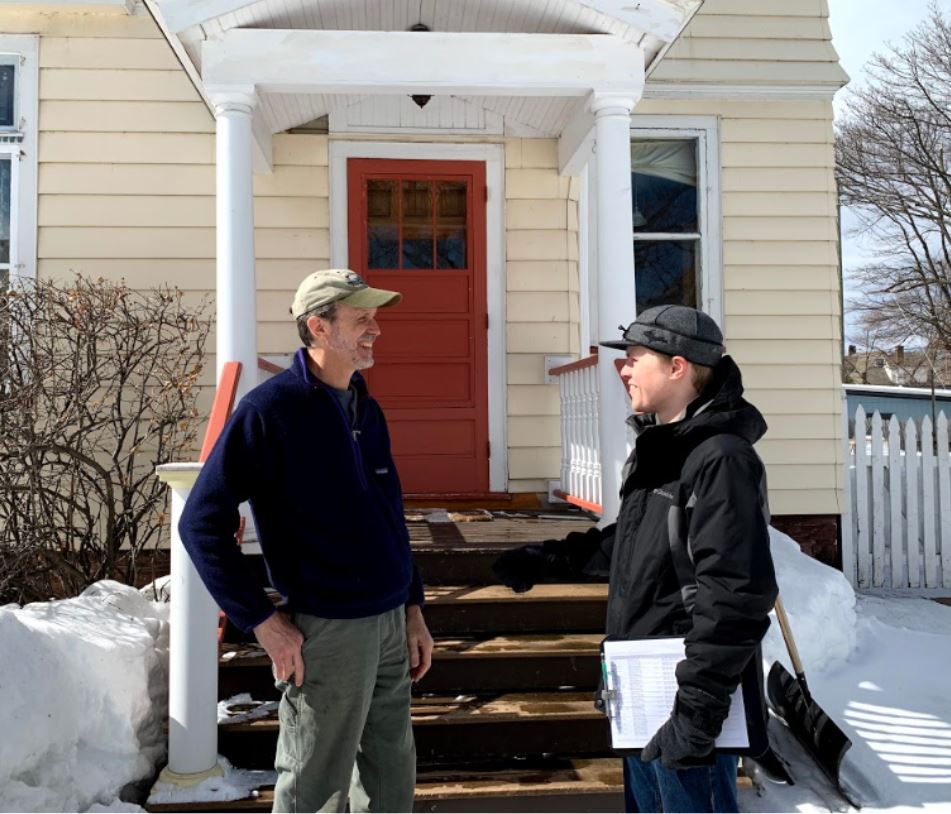
Bonsall estimates that he knocked on 6000 doors to talk to residents during his campaign.
BC: So what motivated all these people to campaign for a 22 year old?
EB: You probably have to ask them, but if I had to guess, I’d say some of them were friends or family, but I did have some people who reached out of the blue asking if they could help, and I think they were excited by the possibility of something new and potentially a source of change in the community.
BC: Did you ever think that some people might think that your campaign as a 22 year old who hadn’t been living here recently was a little weird?
EB: (laughing) Oh, I didn’t think it. I knew it. I remember some people telling me it was pretty weird but I think if initially they were a little skeptical, that personal aspect of locking on people’s doors helped me. And I tried to be active on social media, as well, although I don’t think that’s as important as some people think it is. I think it was just a matter of people getting to know me. I think for every person who thought my campaign was a little strange, there were several people who thought that my youth was an asset, not a liability. And they thought I was talking about issues that mattered to them but weren’t necessarily being prioritized by the City Commission.
BC: Without getting too deep in the political weeds, what are those issues?
EB: First and foremost, the rapidly rising cost of housing here. Actually, I got this stat from one of your articles (WOTS). Housing prices here last year went up 12% and from what I’ve heard, we’re on track for a similar trajectory this year. Rent is also rising rapidly every year. So I talked about that a lot. Another issue–it might seem silly–was creating a dog park all year round in the city. Probably 50% of the people I talked to at their doors were simultaneously holding their dogs back from jumping on me. And they’d look at my little handout and they’d say, “Oh yeah, a dog park! That’d be wonderful!” Another issue that I kept hearing about over and over again was utility rate increases because we’re seeing a lot of people struggling. The number of shutoffs the city has had for water and sewer has risen significantly, and it’s only going to get worse.
BC: In the next five or ten years, where do you see Marquette going?
EB: We’re going to grow and develop as a community but we need to make sure that as we do so, we’re not sacrificing those unique qualities like our public lakeshore and our trail system and our forestlands. I think there’s a growing recognition that sprawl is not a good thing, that it’s neither financially nor environmentally beneficial so that’s something we need to be cognizant of. But I really think that Marquette has a very bright future. As tourism continues to play an increasingly important role in our community, we need to start seeing some more higher paying modern industries moving into Marquette, like what we see with the cyber security initiative or the potential of the Spaceport being located here. So hopefully we start attracting more of those better paying jobs but with that, we need to make sure that the city of Marquette remains a livable community and that we retain what’s special about it. A lot of that gets back to preserving our natural assets and making sure that housing remains affordable in the city and that people aren’t being forced out of town by rising housing costs.
BC: How about your personal future? Now we’re hearing about a very young person–Pete Buttigieg, 37 years old–running for president without the conventional credentials. I’m sure you’re not going to say, “Yeah, that’s what I’m going to do,” but I’ve got to believe that you’re thinking you’ve got a political future beyond the City Commission.
EB: When I started the campaign, I committed to serving for three years, and if the people will have me, three more years after that, so if I can serve the city of Marquette for the next six years, that would be an honor. My only immediate plan is to run for re-election three years if everything goes well. But beyond that, I would still be in my twenties and I’m definitely very passionate about public service, about the UP, and about the Marquette area so…I think state politics is very interesting so maybe I’d get in involved in state politics in some way, either as an elected official or a staff member, something like that.
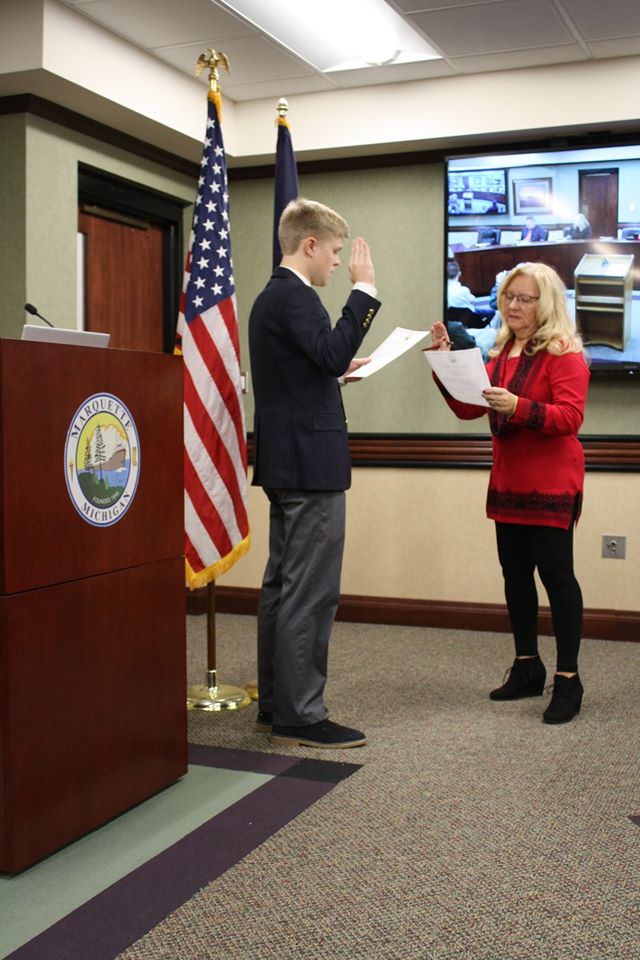
Bonsall was sworn in as a City Commissioner earlier this month.
BC: On your off time from work, what do you do? What brings you joy?
EB: I like to read. I generally like history, nonfiction. I also have an interest in space exploration so I read about that, as well. I like biographies a lot.
BC: Do you have an American hero?
EB: That’s a really interesting question. I think everybody is inherently flawed but if there is one person in this country’s history that I admire a lot, it would probably be John F. Kennedy or Robert F. Kennedy. I mean, nobody’s perfect, right? There were both very flawed people but they still ended up doing good things for the country. I think another thing that’s telling about John Kennedy is that he had a conviction that one person alone, even if he was president of the United States, couldn’t change a country or a society or the world. It had to be all of us. Young people especially need to be engaged, so the idea of civic obligation, of a duty to serve, was something that has really influenced me a lot.
BC: Are you concerned at all about the toxic polarization that we’re seeing now in national politics?
EB: I don’t think there’s many people that aren’t, and I think that’s one of the things that’s so attractive about local government. And I know for a fact, based on conversations I’ve had, that I have support from people who are self-described socialists and from strong Trump supporters, and everything in between. And I know if I had had a letter attached to my name (D or R), that many of those people wouldn’t have considered voting for me. But in a local, nonpartisan race, people are willing to give you the time of day and sometimes they’ll give you their vote. Actually I interned on Capitol Hill for Senator Gary Peters who I have tremendous respect for, and of course I was also involved in state politics a little bit with John Kivela, and what I really learned especially with my experience in Washington was that, if you’re a young person who wants to make a difference in our country, Washington is not the place to be. And our state government, where they can’t even pass a budget, is getting to be the same way. I also think there’s a lot of cynicism in Washington and increasingly in Lansing, so I think as a young person, local government is really the place to be.
BC: So are you ultimately optimistic about the future here in Marquette, and in the nation?
EB: I’m absolutely optimistic about the future in Marquette. About the nation, I think that eventually change is going to come. It’s not going to come from the top down, it’s going to come from the bottom up. It’s not going to come from Washington, its going to come to Washington. There’s going to be a point where people on both sides of the aisle, both conservative and liberal, and everybody in between, will have just had enough with a completely dysfunctional society and dysfunctional government, but I don’t know when that point is going to come.
BC: Thank you, Evan.


